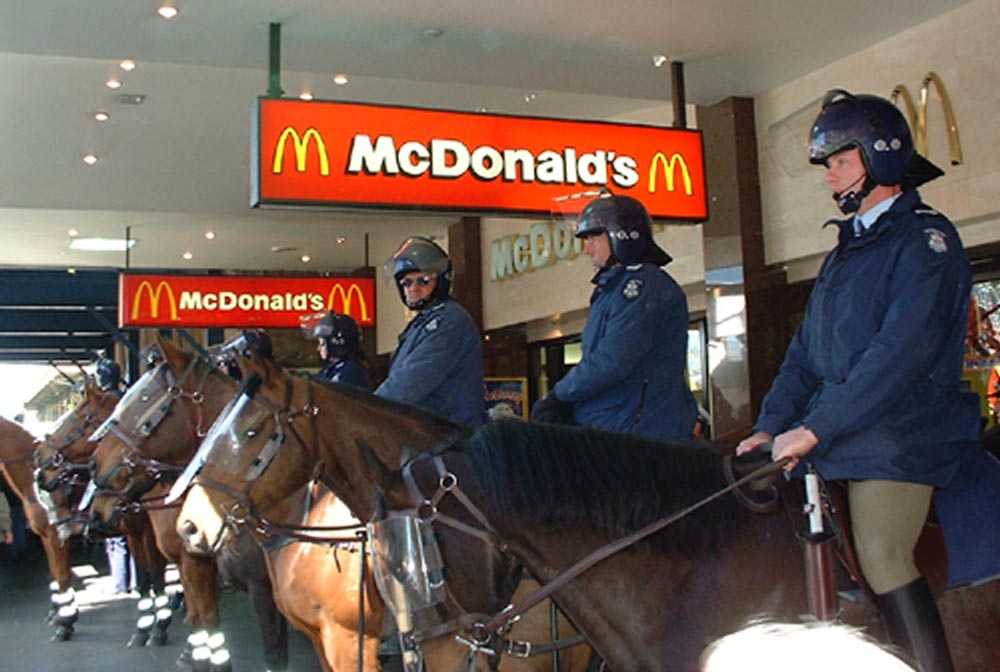
Corporate Cops
Jim Carey reviews a remarkable out-of-court police settlement with widespread implications for the relationship between big business and the police.
July 2000
Out-of-court settlements are usually a way of avoiding embarrassment. A way of mollifying claimants without admission of guilt. So it was highly unusual when an out-of-court settlement agreed by the Metropolitan Police in July was accompanied with a public apology. It was perhaps less unusual that the details of a case with wide implications went unreported in the mainstream media.
The case revolved around the admission by the vice president of a corporation that its security department had easy access to confidential information held on the police's database. And that he and his corporate colleagues used this conduit to gather personal information on its critics.
"All the security department have many, many contacts in the police service," said Sid Nicholson in High Court. "If I wanted to know something about someone, I would almost certainly make contact with the local crimes beat officer, the local CID officer, the local collator."
Nicholson's telling admission was made on May 14 1996 during one of the many lengthy cross-examinations which took place in the mammoth McLibel trial. Before joining McDonald's in 1983, Sid Nicholson had spent 31 years as a police officer, firstly in South Africa and then with the Met. As Vice President of McDonald's UK, Nicholson's job was to oversee several departments including security.
Serving under him as head of McDonald's security department was Terry Carrol, who, like Nicholson, had reached the rank of Chief Superintendent in the Metropolitan Police before joining the burger corporation. In fact, as Nicholson said under cross-examination, the McDonald's security department "are all ex-policemen".
It transpired that both Terry Carrol and Sid Nicholson had met with Special Branch agents on several occasions at a variety of venues, and even stood with them on public demonstrations. The exchange of information between police and corporate security involved personal information on, and the home addresses of, several activists including the two defendants in the McLibel trial. Helen Steel and Dave Morris, subsequently launched proceedings against the Met in September 1998, claiming damages for misfeasance in public office, breach of confidence and breach of their right to privacy.
The two named targets of their claim were the Metropolitan Police Commissioner and a CID officer, Detective Sergeant David Valentine.
DS Valentine's appearance in the frame came via a circuitous investigative route. When McDonald's first considered suing activists for distributing critical material back in 1989, the Corporation hired the services of two investigation agencies to infiltrate the activist group, London Greenpeace. In the run up to the rights-to-privacy trial, Dave Morris and Helen Steel "became aware" that McDonald's had failed to disclose all the log book of one of the undercover agents, Allan Clare. McDonald's claimed the missing sections were not relevant. However, Steel and Morris discovered that the missing sections noted two meetings between Allan Clare and DS Valentine at Southwark Police Station. During the meeting confidential information was exchanged. Police records now confirm the meeting took place. It was discovered that DS Valentine was involved in Operation Carnaby, the police investigation which followed the Trafalgar Square anti-poll tax demonstration. When Dave Morris applied under the data protection act to view his police record he found the words "Veteran of the poll tax riots" next to his name even though he had no convictions associated with the event.
The evidence now demonstrated a three way exchange of so called confidential information between the police, a corporate security department and a private investigation firm in the service of a corporation. And what's more, it all appeared quite normal.
Faced with such damning evidence, the Met Police agreed to a £10,000 plus all legal costs settlement in July in order to avoid what they called "a difficult and lengthy trial".
Under the terms of the settlement, the Metropolitan Police agreed "to bring this settlement to the attention of the 3 Area Commanders of the Metropolitan Police force and ask them to remind their officers of their responsibility not to disclose information on the Police National Computer to a third party". Complying with the consent order, DS Valentine stated he "regretted any distress of the claimants caused by the disclosure of their details" to a private investigator.
Many corporate security departments are now made up of ex-British policemen pursuing lucrative service with corporations. They are all likely to have relationships with currently serving officers. Whilst the apology and commitments forced from the Metropolitan Police by Steel and Morris were an achievement in accountability, the relationship they helped uncover appeared par for the course. How effective will the Met Police's memo to area commanders be in curbing the incidence? And what checks and balances are there to regulate this collusion between public servants and corporate agents nationwide?
Related Articles
Cashing In On The Coppers - Investigation into creeping privatisation of British police force - 2001
For the full list of Squall articles about the McLibel Trial click here
Links
McSpotlight - the McLibel campaign website - www.mcspotlight.org
